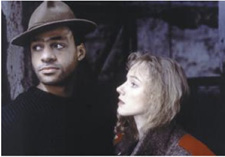Film Festival Celebrates Women of East Germany

Area residents can get a glimpse of the lives of East Germany women – both pre- and post unification – through the acclaimed documentaries and feature film presented at the East German Film Festival at The University of Scranton. Now in its fourth year, the festival, which is free of charge and open to the public, will be held on Monday, Nov. 1, through Wednesday, Nov. 3, in the Moskovitz Theater of the DeNaples Center. All screenings begin at 7 p.m. and will include a brief overview. Following each film, there will be time for discussion.
The documentary films “The Beauties of Leipzig” (Nov. 1) and “After Winter Comes the Spring” (Nov. 3) examine the desire for change and hope expressed by women of East Germany before the fall of the Berlin Wall, as well as the roles East German women played at home and work in the reunited Germany.
The festival also includes a feature film “Herzsprung,” which looks at the life and new romance of an unemployed young mother and widow. “Herzsprung,” directed by Helke Misselwitz, will be shown on Nov. 2.
“We are pleased to include two films by Helke Misselwitz,” said Jamie Trnka, Ph.D., assistant professor of world languages and cultures at The University of Scranton. “Although many women were involved in film production in East Germany, Misselwitz was one of only a handful of women to achieve the rank of director at the state-run film studios, DEFA.”
This year’s East German Film Festival is sponsored by the Department of World Languages and Cultures, the Jane Kopas Women’s Center and Women’s Studies at The University of Scranton.
For additional information, call Dr. Trnka 941-7430.
A summary of each film follows.
Movie Summaries:
Nov. 1, 2010: “The Beauties of Leipzig” (“Sag mir, wo die Schönen sind”). Dir. Gunther Scholz, 2008, Germany, 90 minutes. The film portrays contestants for the title of “Miss Leipzig,” a town formerly in East Germany. In 1989, photographer Gerhard Gäbler captured a series of fascinating double-portraits of the women at home and in the workplace. Eighteen years after the fall of the Berlin Wall, Gäbler teamed up with director Gunther Scholz to track down and interview nine of the women about their lives in a reunited Germany.
Nov. 2, 2010: “Herzsprung.” Dir. Helke Misselwitz. 1992, Germany, 87 minutes. “In the little town of Herzsprung – whose name can mean either ‘heartbreak,’ or ‘heart leap’ – almost nothing has changed since German unification. Nothing, that is, except a rise in unemployment. Johanna, a young mother and widow, is one of the unemployed and has to live on welfare. To make matters worse, she falls in love with a dark-skinned, roving adventurer and the whole village is talking about it.” (DEFA Film Library at UMass Amherst)
Nov. 3, 2010: “After Winter Comes the Spring” (“Winter Adé”). Dir. Helke Misselwitz, 1988, Germany, 116 minutes. “A journey from the North to the South during the last year of the GDR. Everyone’s wish for changes can be felt everywhere. Punk girls, female workers, intellectuals, mothers, young and old women – Helke Misselwitz talks to women about humanity in their country. In every meeting you feel the mutual sympathy. Sympathy for the strong and self-confident women who point out the dubieties with confidence and for those who are looking for their place in life, struggle with it and work hard. The film is full of humor, proximity and warmth. Despite all the criticism, the hope for a future more human remains.” (PROGRESS Film-Verleih)






